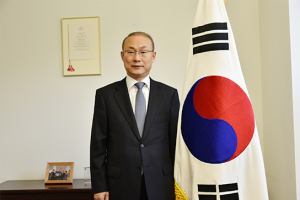Response from Hamburg Korean Consulate : a lot of words, but little meaning.
The following email was received from the Korean Consulate General’s office in Hamburg, Germany; a long and verbose letter, from Vice Consul Kim, Nam-ho, which is full of the ‘text book’ standard responses on the dog-meat subject; for example: he owns a dog, therefore he, too, cares about dog abuse and cruelty (hardly proof positive of his love for all dogs); implying that this cruelty is perpetrated by very few Koreans (not what the facts prove); and bringing up the same old argument that Dr Dogmeat uses, that at some time in history, other cultures also ate dogs, particularly at times of famine/war etc. (one of the most pointless arguments anyone can make, as no one can justify unacceptable actions today on the basis of what happened centuries or even decades ago!).
Vice Consul Kim seems to go on to contradict (or confuse) himself and states that (Germany etc.) are “highly developed and prosperous countries” and hopefully Korea will soon be like these countries (he lost us here: does he mean Korea will become ‘highly developed’ or ‘prosperous’ or a country that is not in a state of war/famine?!). Whatever he thinks his letter means, we think his letter is meaningless! So keep writing and calling! Don’t let them get away with it!
Click HERE to contact Korean Embassies and Consulate Generals’ offices in your country.
Subject: In response to your letter of January 21st
Date: June 23, 2016 at 6:20:18 AM PDT
To: ————–@icloud.com
Dear Ms. Ruston,
We have received your letter of January 21st explaining your concerns about animal cruelty issues in Korea. I would first like to express my appreciation for your interest in my country and attention to this matter.
I have seen the images of cruelty to cats and dogs that are circulating on the social media and when I saw these pictures, I too felt sad and disgusted. I personally have had a dog for 8 years even though this is not always a simple matter given the nature of my profession and I hope that my dog, my faithful friend, will always be by my side. In light of this the slaughter of these sensitive animals is unacceptable and unthinkable.
Unfortunately,there are people in Korea who have no respect for animals and no sense of guilt killing these kind beings for their own profit. However, it would be unfair and improper to label Korean citizens as animal abusers, since there are various actions to prevent such instances and campaigns among Koreans themselves. So, if you kindly allow me to explain, I would like to draw attention to some points concerning this topic.
Surely,dog meat consumption has been considered as an old custom in the West and most societies have now banned the eating of dog meat. But, it seems to be forgotten that less than 100 years ago here in Central Europe eating dog meat was a common practice in some areas as a culinary fad or as a regional tradition. In Korea’s case, the consumption of dog meat started against the background of the food shortages during the war and the same experience was found also in Germany and France.
Of course, there is no doubt that the significance of the dog as a pet in France and Germany is unquestionable nowadays and I believe it is an indication thatwe are living in highly developed and prosperous countries. I think this is a desirable standard that Korea needs to follow and I hope this this may mark a change in perception amongst those in Korea who consider that the dog is stillan inferior animal.
Moreover,the criteria for determining what is an edible animal and how we handle the slaughtering of those animals must be discussed. As I mentioned, there are many Koreans who have a strong emotional attachment to animals and care and place importance on coexistence with them. Objectively speaking, the discussion of eating dog meat and its justification are complicated and similar to questions of religion or matters of personal taste. If it is not possible to see immediate change in the situation relating to the consumption of dog meat,observing regulations for the slaughter of animals for food is important indeed. In this regard, the introduction of the Animal Protection Act in the year of 1991 was a meaningful step.
Despite the complexity of this matter which is one pertaining to cultural relativism, I believe that Korea will gradually adjust to the German standards in both respects: slaughtering animals and handling animals properly. Nowadays, more and more Koreans have misgivings about the concept of dog meat and the animal rights movement is gradually growing. In addition, the Organization KARA (Korea Animal Rights Advocates) has recently opened a training animal rights training centre in Seoul.
An experience which arose due to food shortages during a time in our history should not be taken as a moral compass of Korea. Instead, it is important to realize that looking at the past can help us to understand the relativity of values that are subject to changes in the times. I hope that this is of some value in terms of gaining a full understanding of the situation in Korea and offers hope for the future.
Best regards,
Kim, Nam-ho
Vice Consul




































Leave a Reply